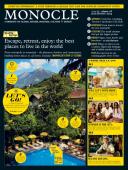
Issue 75
Escape, retreat, enjoy: the best places to live in the world. From metropolis to mountain – the planners, thinkers and campaigners building better places to call home. Includes: Monocle’s top 25 cities
In This Issue
Oops! No content was found.
Looks like we no longer have content for the page you're on. Perhaps try a search?
Return Home

